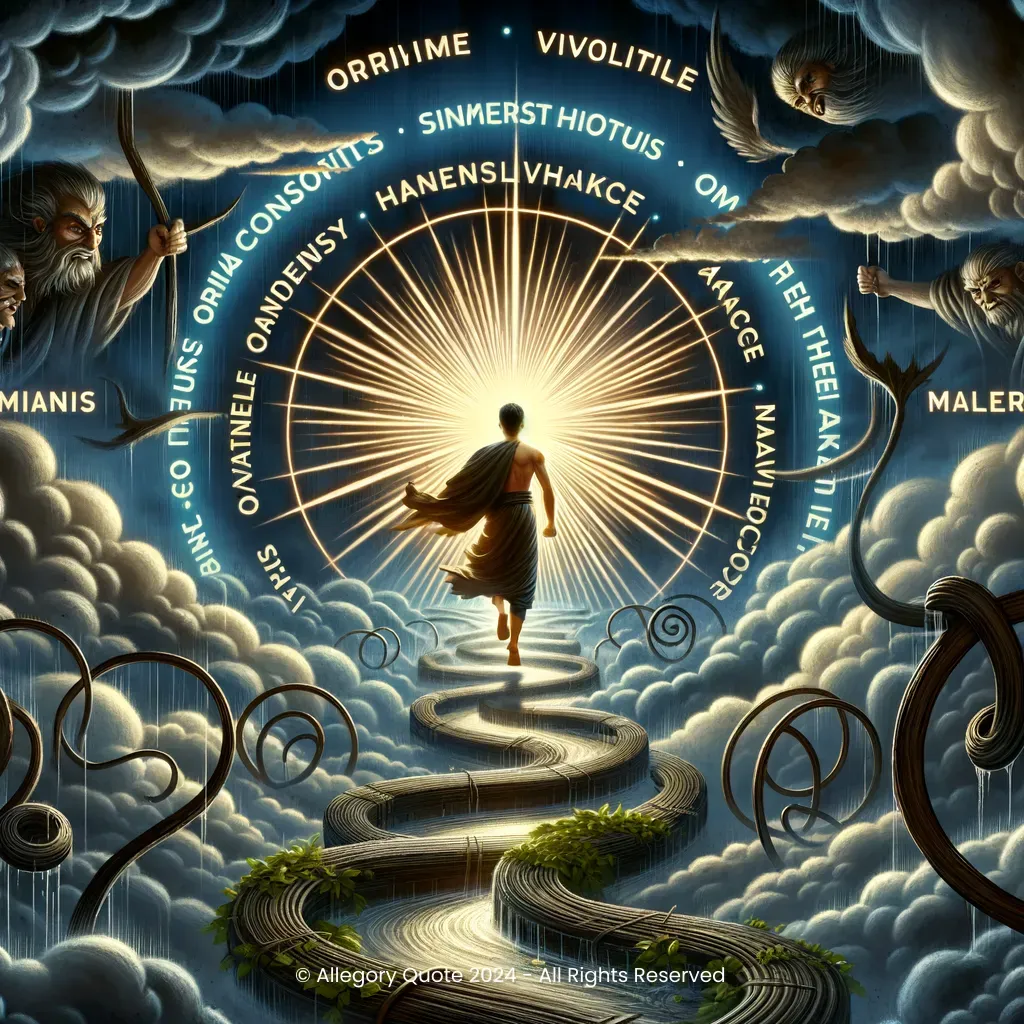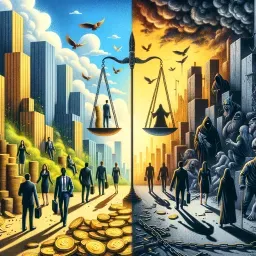”The path of the righteous man is beset
on all sides by the inequities of
the selfish and the tyranny of evil men“

0
0
0
0
- Meaning
- The phrase explores themes of morality, righteousness, and the struggle against malevolence. It reflects a philosophical conflict between good and evil, underscoring the challenges faced by those who strive to lead a virtuous life. Psychologically, it illustrates the weight of external and internal conflicts experienced by individuals, especially when surrounded by negativity or malevolence. Historically, the invocation of Biblical imagery serves to elevate the discourse surrounding moral authority and human conduct.
- Allegory
- In the image, the righteous figure embodies integrity, representing the struggles faced by those committed to moral principles. The dark clouds symbolize the selfishness and tyranny confronted daily, while the illuminated path signifies hope and the potential for overcoming challenges. The battling shadows illustrate the ongoing conflict with malevolence, and the rays of sunlight reflect the promise of justice and righteousness prevailing.
- Applicability
- This phrase can serve as a powerful reminder of the moral challenges individuals face daily. In personal life, it encourages one to remain steadfast in their principles despite adversity, emphasizing resilience against selfishness and malevolent influences. It promotes self-reflection, urging individuals to consider how they respond to those challenges.
- Impact
- The phrase has become iconic in popular culture, often quoted and referenced in various discussions about morality, justice, and personal struggle. It has inspired numerous analyses of good versus evil themes and has a notable impact on film studies and literary discussions, given its prominent placement in a seminal modern film.
- Historical Context
- The film 'Pulp Fiction' was released in 1994, and this phrase, while inspired by Biblical texts, reflects the cultural and moral complexities of the early 1990s. The dialogue serves to enhance character development and thematic depth within the film's narrative. It captures the struggles of individuals against the backdrop of a morally ambiguous world.
- Criticisms
- Critics of this phrase argue that it may oversimplify complex moral issues by presenting a binary view of good versus evil. Some interpretations could contend that it might lead to a victim mentality, emphasizing the external struggles over internal accountability. Arguments against the interpretation could focus on the necessity of recognizing the nuances in human behavior and morality.
- Variations
- Variations of the phrase can be found in various cultures, often in proverbs about justice and the human condition. For example, the African proverb 'If you think you're too small to make a difference, try sleeping with a mosquito' expresses a similar idea about the impact of small actions against larger adversities. Interpretations of good versus evil can vary greatly, often shaped by cultural beliefs and values surrounding morality.
-

I’m gonna get medieval on your ass.
-

Say 'what' again. I dare you, I double dare you!
-

I just shot Marvin in the face.
-

I don't like violence, Tom. I'm a businessman. Blood is a big expense.
-

I'm sorry, did I break your concentration?
-

I spent my whole life trying not to be careless. Women and children can afford to be careless, but not men.
-

You ever heard the philosophy that once a man admits that he's wrong, he is immediately forgiven for all wrongdoings?
-

This is the life we chose, the life we lead. And there is only one guarantee: none of us will see heaven.
-

I love you, Honey Bunny.
-

Power wears out those who do not have it.
-

Zed’s dead, baby. Zed’s dead.
-

Don't sweat the small stuff.
No Comments